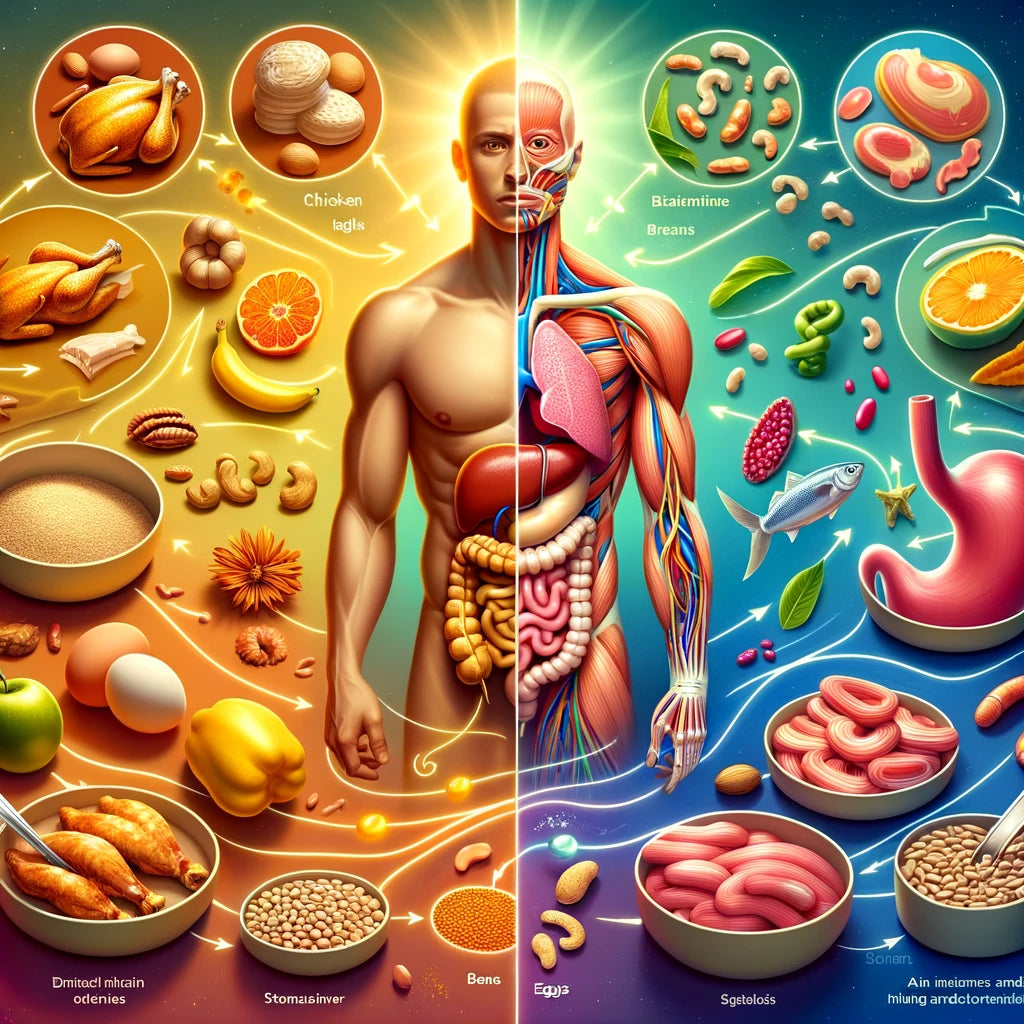Protein is a crucial component of a balanced diet, essential for the construction, repair, and maintenance of body tissues, as well as for the production of enzymes and hormones that play key roles in various bodily functions. This article is designed to give readers a comprehensive insight into the complex world of proteins within nutritional science. The aim is to explore the different aspects of protein consumption, from the biological basis and the body's processing of proteins to the effects of both an excess and a deficiency of this macronutrient. All of this is presented from a neutral and informative perspective, aimed at an audience interested in optimizing their diet and lifestyle.
What are proteins?
Proteins are large, complex molecules that are fundamental to the structure, function, and regulation of the cells, tissues, and organs in our body. They consist of amino acids, the building blocks, that are arranged in various sequences to form different proteins. The sequence of amino acids in a protein determines its shape and function. Proteins differ significantly from other macronutrients such as fats and carbohydrates. While carbohydrates and fats serve primarily as energy sources, proteins play a crucial role in almost every biological activity, including building muscle mass, repairing tissue, and producing enzymes and hormones.
Example:
Take hemoglobin, for example, a protein in red blood cells responsible for transporting oxygen throughout the body. This is completely different from the role of glucose, a carbohydrate that primarily provides energy for cellular processes, or of triglycerides, a form of fat that serves as a long-term energy store.
Processing of proteins by the body
The body processes proteins by breaking them down into their basic components, the amino acids, which can then be used to synthesize new proteins or converted into energy. This process begins in the stomach, where enzymes and stomach acid begin breaking down protein structures. In the small intestine, these proteins are further broken down into amino acids by pancreatic enzymes and intestinal enzymes. These amino acids are then absorbed by the small intestine and transported to the liver, where they are further processed.
Although this process is generally efficient, problems can arise with certain diseases or conditions that affect the absorption or processing of proteins. This can lead to a range of health problems ranging from nutritional deficiencies to more serious conditions.
-
Cystic Fibrosis: This genetic condition affects multiple organs in the body, including the pancreas. This can lead to reduced release of pancreatic enzymes, which are essential for the breakdown and absorption of proteins (and other nutrients).
-
Celiac disease: An autoimmune disease in which gluten consumption leads to damage to the lining of the small intestine. This hinders the absorption of amino acids, among other nutrients.
-
Chronic Pancreatitis: Long-term inflammation of the pancreas that can reduce the secretion of enzymes necessary for the breakdown of proteins, impeding the efficient absorption of proteins.
-
Liver cirrhosis: The liver plays a crucial role in the processing of amino acids. Liver cirrhosis can seriously affect this function, leading to problems in protein metabolism.
-
Phenylketonuria (PKU): A rare hereditary condition that affects the body's ability to break down the amino acid phenylalanine, a building block of proteins. This requires a strict diet to limit phenylalanine intake.
It is essential to be aware of these and other conditions that can affect protein metabolism. If you have symptoms or suspect problems related to protein processing, professional medical advice is essential.
It is important to emphasize that we are not medical professionals. If you suspect problems related to protein processing, it is advisable to consult a qualified doctor.
In a later article, we will delve deeper into specific diseases and disorders related to protein metabolism, including their symptoms, causes, and treatment options, to provide a better understanding of the complexity of the body's relationship with proteins.
Effects of too much protein
Excessive protein intake, like any nutrient imbalance, can have health consequences. Although protein is essential for the body's growth and repair, too much of it, especially over a long period of time, can lead to a variety of health problems.
Consequences of too high protein intake:
- Stress on the Kidneys: The kidneys play a crucial role in removing waste products of protein metabolism, such as urea. High protein intake can overload the kidneys, especially in people with pre-existing kidney disease.
- Increased risk of heart disease: Diets with very high protein intake, especially from animal sources, may be associated with a higher risk of heart disease, partly due to an increase in saturated fats and cholesterol in such diets.
- Bone health: There is some evidence that long-term high protein intake can increase calcium excretion, potentially negatively impacting bone density. However, this point remains controversial and requires more research.
Benefits of a high protein intake:
- Muscle building and recovery: For athletes or people who train intensively, an increased protein intake can help with muscle building, recovery, and performance improvements.
- Satiety and weight management: Protein can provide a feeling of fullness, which can aid in weight management by reducing overall energy intake.
Effects of a protein deficiency
A deficiency of protein in the diet can have serious consequences for the body, especially because proteins are essential for almost all bodily functions.
Consequences of a protein deficiency:
- Reduced muscle mass: Protein is essential for maintaining muscle mass. A deficiency can lead to muscle atrophy.
- Growth disorders: In children, a lack of protein can hinder growth and development.
- Immune system: Proteins are crucial for antibody formation; a deficiency can weaken the immune system.
- Skin, hair, and nail problems: These can be signs of a protein deficiency, as protein is crucial for their health and recovery.
Benefits of a limited protein intake:
In some cases, moderate protein restriction may be beneficial, especially for individuals with certain health conditions, such as kidney disease, where lower protein intake may slow the progression of the disease.
Identifying your protein needs
Determining individual protein requirements is essential for optimal health and performance. This need may vary depending on age, gender, body weight, physical activity, and health status.
Methods to determine protein requirements:
- Dietary Guidelines: Many health organizations offer general guidelines for protein intake based on body weight and activity level.
- Food diaries and apps: Tracking your food intake with diaries or apps can help monitor your protein intake.
- Consultation with nutritionists: For a personalized approach, a consultation with a nutritionist or dietitian may be helpful.
Types of Protein Requirements:
-
Standard protein requirements: The average adult who leads a sedentary lifestyle needs approximately 0.8 grams of protein per kilogram of body weight per day. This level is sufficient to meet basic needs for tissue repair and maintenance.
-
Increased Protein Requirements for Athletes: Athletes or individuals who regularly participate in strenuous physical activities may have increased requirements ranging from 1.2 to 2.0 grams of protein per kilogram of body weight per day. This supports muscle recovery, building and maintenance.
-
Protein Requirements for Weight Loss: People looking to manage or reduce their weight may benefit from a slightly higher protein intake (around 1.0-1.5 grams per kilogram of body weight per day) to increase satiety and maintain muscle mass during a calorie deficit.
-
Protein Requirements in the Elderly: Older adults often have higher protein requirements, approximately 1.2 grams per kilogram of body weight per day, to maintain muscle mass and function and combat sarcopenia (muscle loss associated with aging).
Examples:
- Standard adult (70kg): A sedentary adult weighing 70kg would need approximately 56 grams of protein per day.
- Athlete (70kg): A 70kg athlete may need between 84 and 140 grams of protein per day, depending on the intensity of the training.
- Senior (70kg): An older adult weighing 70kg would need approximately 84 grams of protein per day.
General recommendations for protein consumption
For our readers interested in optimizing their diet and lifestyle, it is important to take a balanced approach to protein intake. A diet that provides enough high-quality protein from a mix of sources — both animal and plant-based — can support health and well-being. It's important to pay attention to your own body and any signals it gives in response to changes in your diet.
In the context of various diets and lifestyles, protein plays a central role, not only as a building block for the body, but also as an essential element for health and well-being. Below are some examples of diets in which proteins form an important part of the nutrition plan. In future blog posts we will discuss these diets in more detail, with specific attention to how they can meet the varying protein needs of individuals.
Examples of high protein diets:
-
Bodybuilding diet: This diet is very focused on building muscle mass and therefore requires a higher protein intake. Protein sources often include lean meats, fish, eggs, and supplements such as whey protein. We will further explore the specific protein strategies and sources that are popular within the bodybuilding community.
-
Protein-Sparing Modified Fasting (PSMF): This is a very low-calorie diet intended for rapid weight loss, where protein intake is kept high to maintain muscle mass. It relies heavily on lean protein sources and is often used under medical supervision.
-
Athletic Performance Diet: For athletes looking to optimize their performance, protein plays a crucial role in recovery and muscle building. Diets vary depending on the sport and individual needs, but include a balance of plant and animal proteins, adapted to the intensity of the training.
-
Plant-based protein diet: For those who follow a vegetarian or vegan lifestyle, this diet focuses on getting enough protein from plant-based sources such as legumes, nuts, seeds, and soy products. The emphasis is on combining different foods to ensure a complete amino acid profile.
In future articles we will explore these diets in more depth, with a special focus on the role of protein within each diet. We will discuss the benefits and potential challenges, as well as tips for optimizing protein intake within these specific dietary patterns. The goal is to provide readers with comprehensive insights into how different diets can help achieve their health and fitness goals while meeting their protein needs.
It's important to remember that while these diets provide guidelines, individual needs may vary. Professional advice from a nutritionist or dietitian can be valuable in personalizing a diet plan tailored to personal health goals, lifestyle and dietary preferences. For now, we remind our readers to always seek professional medical advice if in doubt or have any health concerns.


